|
Hugo "Hughie" Cannon (April 9, 1877 to June 17, 1912) | |
 Compositions Compositions | |
|
1899
I Don't Want No Jonah Hanging 'Round1900
Just Because She Made Dem Goo Goo Eyes [1]Don't You Think You'd Like to Fondle Me 1901
Don't You Never Take No Ten Cent Drink on MeYou Needn't Come Home I Hates to Get Up Early in the Morn' [1] Sewie, No More Chop Suey for Me [1] 1902
Bill Bailey, Won't You Please Come HomeIf I Get Back to Nashville, Tennessee Hard Shell Baptist Choir 1903
Alic Busby, Don't Go AwayDe Mason and Dixon Line Won't You Kindly Hum Old Home Sweet Home to Me I'll Leave It to You (The Chapter Song) [1] |
1904
He Done Me Wrong (The Death of Bill Bailey)I Love to Two-Step With My Man Put Me Wise Jim Badger Babe, You'd Better Stay Home Little Gertie Murphy For de Lawdy Sakes, Feed My Dog Albany, or Dat's de Only Town Looks Good to Me [3] 1905
The Prince of Borneo [4]Possum Pie, or The Stuttering Coon [4] Ain't Dat Too Bad: An Ethiopian Wail [5] Unknown/Uncertain
Here's to AmericaDaughter of Uncle Sam
1. w/John Queen
2. w/May Irwin 3. w/Ben M. Jerome 4. w/Joseph C. Farrell 5. w/Charles Kohlman |
Hughie Cannon represents a tragic story of tortured talent who, in the end, was not able to overcome his demons and let his potential be fully realized. Just the same, he did leave us with a few gems, and only a few clues on who he actually was or where he came from. Responsible for one of the most sung ragtime songs of the 20th Century, he was not only a friend of the prototype Bill Bailey, but shared some of his more unfortunate traits.
Hugo Cannon was born in Detroit, Michigan, to actors John S. Cannon and Mary "May" Brown on April 9, 1877, some seven months after their Illinois marriage.
The 1880 and 1900 censuses both suggest a birth year of 1878, as do some accounts of his death. However, his official birth record in Detroit clearly shows 1877 as the year. May and John were likely on the outs around that time, and by June 1880, when the census was taken, she had remarried to William H. Smith. They were rooming with May's widowed mother, Rose Brown, in Detroit. Neither listed an occupation, and were instead put down as boarders. Hugo's birth name of Cannon was not included, as he was listed under his stepfather's name of Smith.
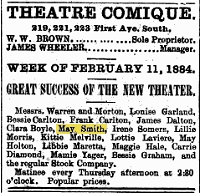 |
The boy likely spent a number of years living with his grandmother during the seasons that his mother and stepfather were touring the country in various troupes. His mother was rather petite and of direct Irish ancestry, so played the cute Irish lass on stage for as long as she could. In a notice from St. Paul, Minnesota, on November 12, 1882, it touted a "new face... Miss May Smith, a celebrated skipping rope song and dance lady, is another new arrival." That appears to have been her act for the next few years. William's role in the relationship is unclear, but he was likely a manager or stage hand, as his name does not appear in notices. Much of her work appears to have included long stints in St. Paul, particularly through the first few months of 1884 as well as 1885. It is possible that Hugo was able to visit her there at some point each year. However, notices including her appear in other Midwest cities as well during the 1880s. In 1887 May toured as the star of the four-act comedy Fogg's Ferry, and the following year in The Waifs of New York.
In 1891 a play that would make her reputation was launched with a theater company managed by Mr. Fred G. Robbins. Little Trixie, starring May in the title role, would tour for several years. During the second season, when Hugo was 15, he was included in the company as per the standard notice of theatrical companies in the New York Dramatic Mirror on September 10, 1892:
LITTLE TRIXIE: Fred. Robbins, manager; M.F. Luce, business manager; Sanford H. Ricaby, advance; W. Morris Ellis, musical director. Nat Franklin. Harry Mitchell, Harry Beck, W.E. Owens, Master Hugo Cannon, May Smith, Ruth
Craven, Gertie Williams, and Teddy Wesley.
Hugo was a property person and stage hand, but appeared on stage briefly in a few different roles over the years. Little Trixie ran for seven years during the fall to winter season. By 1892, May had divorced William Smith, and as of the 1894 season she was married to the manager, Fred Robbins, going by May Smith Robbins so she could benefit from her previous fame. A typical review of the production was found in the Washington Evening Times of December 22, 1896.
May Smith Robbins, a song and dance edition of Lotta, is the star at the Bijou Family Theater this week. Her play of "Little Trixie" is an up-to-date edition of "the Little Detective," and with the assistance of a clever company, of which her husband, Fred Robbins, is the manager and leading comedian, she makes the piece a success... Eugene Millard plays a star villain part as the scoundrelly old lawyer, while Nat Franklin as the darkey, and Hugo Cannon, the boy drum-major, do good work and specialties.
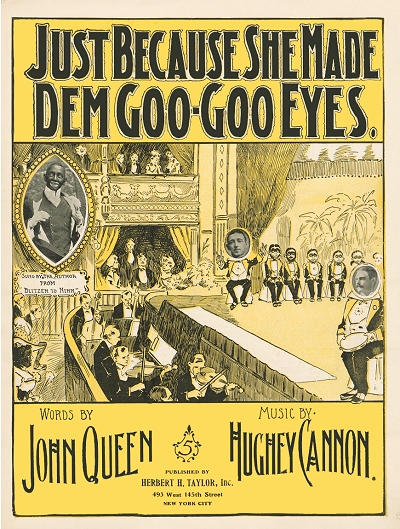 After the last season of the Little Trixie ended in early 1898, Hugo decided to stay in show business, and managed to land a spot with Barlow's Minstrels as a song and dance man, also playing the piano for some acts. A self-promotion for them was found in the New York Clipper of July 30, 1898:
After the last season of the Little Trixie ended in early 1898, Hugo decided to stay in show business, and managed to land a spot with Barlow's Minstrels as a song and dance man, also playing the piano for some acts. A self-promotion for them was found in the New York Clipper of July 30, 1898:NOTES FROM BARLOW'S MINSTRELS — We are now in the eighth week of our Summer season, and have met with success in each one of the parks we have played, breaking the records in all places. Our show has been pronounced by all the public press and managers as being the best and finest equipped minstrel show in the business... The laughing song of Lew Baldwin is hitting them hard, and the buck dancing of Hugo Cannon makes the audience yell...
Another glowing notice appeared in the Paducah [Kentucky] Daily Sun on September 29, 1898:
The solos by Messrs. Hood, James, Frank Holland, Lew Baldwin and Hugo Cannon, were up to the standard, while the comedy was new and clean. Briggs, as a trick rider, performed many marvelous feats, while Cannon and Russell, in their dance specialty, evoked great applause.
Hugo remained with Barlows for the 1898 to 1899 season, then signed with Vogel's Minstrels for the 1899 to 1900 season. What was not known to the general public at this time, but was likely apparent to his colleagues, was Cannon's growing dependence on alcohol and other substances. In a later interview he claimed to have started in drinking at age ten, and in yet another he said it was sixteen. Even if either of these was an exaggeration, by his early twenties he was well on the way to his eventual demise, yet also just at the beginning of a career as a capable and popular songwriter. It is a little-known assertion that Cannon was also an artist, and at one point had considered a career in cartooning, but ragtime had other plans for him.
As of the June 1900 census, May S. Robbins was still on the road, temporarily lodging with the Paulus family in Detroit, listed as an actress. Her son, Hugo, was also back in the Detroit area but living with his grandmother Rose (she vainly cited him as her nephew to the enumerator), and listed as an actor. But he was more than that by now. Influenced by his peers in the Minstrel companies, he had composed his first publishable piece, I Don't Want No Jonah Hanging 'Round. Emboldened by its minor success on stage and on the shelves, he penned the "coon song" Just Because She Made Dem Goo Goo Eyes with fellow actor John Queen, and after a few tries managed to sell it for a reported $25 (it was likely a bit more) to Howley, Haviland & Company.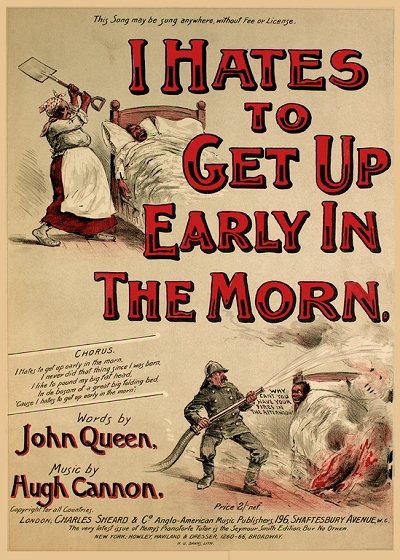 That company was managed in part at that time by composer Paul Dresser, and he soon became one of Hugo's champions. The cover showed Cannon and Queen as themselves on the minstrel stage, along with an image of Queen in blackface as he performed the piece From Blitzen to Ninn.
That company was managed in part at that time by composer Paul Dresser, and he soon became one of Hugo's champions. The cover showed Cannon and Queen as themselves on the minstrel stage, along with an image of Queen in blackface as he performed the piece From Blitzen to Ninn.
 That company was managed in part at that time by composer Paul Dresser, and he soon became one of Hugo's champions. The cover showed Cannon and Queen as themselves on the minstrel stage, along with an image of Queen in blackface as he performed the piece From Blitzen to Ninn.
That company was managed in part at that time by composer Paul Dresser, and he soon became one of Hugo's champions. The cover showed Cannon and Queen as themselves on the minstrel stage, along with an image of Queen in blackface as he performed the piece From Blitzen to Ninn.Dresser may have also influenced or been partially responsible for the name change. Hugo was not a great show business name. To complicate things, there was a controversial leader of the Mormon Church, one that many considered to be somewhat of a public bully with dangerous ideas, named Hugh Cannon. Although he had made the news in Utah for various infractions and statements as early as the 1880s, Mr. Cannon was a regular item in the national news by 1900, much of it controversial, and he was hooked in with a questionable senator as well. Perhaps hoping to identify himself separately, Hugo became Hughey, then in short order Hughie, the name that stuck for his few remaining years.
Hughie continued to perform on the vaudeville stage with Queen for at least one season. He also continued to write music, getting two of his own published over the next year. You Needn't Come Home has been regarded by some historians as one of the first songs that could be considered part of the "commercial blues" genre, with its 12-bar construction for both verse and chorus. Cannon and Queen also turned out a couple of minor hits in 1901. I Hates to Get up Early in the Morn just slightly pre-dated, and may have even influenced Harry Von Tilzer's huge 1902 hit, Please Go 'Way and Let Me Sleep. Ultimately, it was another friend of Hughie that would wind up making him, well, in the end simply famous, but hardly rich.
After the 1901 season Hugh returned to Michigan, this time to Jackson, about 80 miles due west of downtown Detroit. There he quickly gained a reputation as a likable and stellar ragtime pianist. Jackson was considered to be a rather rough railroad town, and was sometimes referred to as "Little Chicago." The Michigan Central Railroad kept one of their major satellite repair shops there, and an average of 3,000 railroad employees either lived or lodged around Jackson at any one time. The 1900 City Directory lists 75 saloons around the downtown area, so there were plenty of opportunities for Hughie to play, and to drink his wages.
Hughie was remembered in a 1960s newspaper article by one Jackson citizen: "He will be out on the street singing after the saloon is closed and probably be in jail before morning. During the night, he will write a song and the music for it. What a gift!" One saloon in particular has often been identified as the one where Cannon's most enduring song was born, a male-only establishment where Hughie played piano. It is usually identified as Conrad Diedrich's saloon at 213 E. Main St. (which is now East Michigan Avenue, the main drag through town). This same place was written up in a 1973 feature in a Detroit paper. Writer James Treloar gave a lurid and colorful word picture of Diedrich's: "Men could get beer for 5 cents a pint, bar whiskey right out of the barrel for 10 cents, listen to a drifter named Hugh Cannon pound the piano keys, and later on begin eyeing the bawdy house upstairs over the grocery across the street."
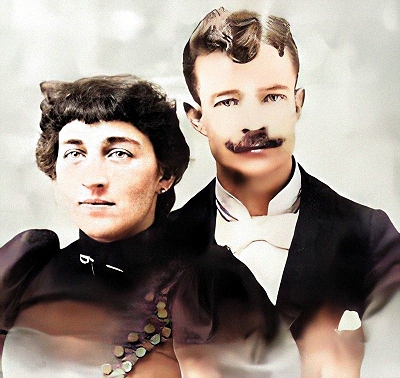 |
There are many stories about how Cannon's famous song came about, and who it was about. One states that it was about half of the black vaudeville team of Bailey and Cowan. Cannon supposedly hosted Bailey at a local hotel that night, claiming that Mrs. Bailey might see the error of her ways the next day, which then did not transpire as planned. Given that the song was about a black couple, this would seem plausible. However, a more accurate accounting has emerged in recent years that can be told with some caution taken as to its authenticity.
Upon his settling in Jackson, Hughie became friends with a local musician and Jackson native, Willard Godfrey Bailey. His parents ran a photographic outfit in Jackson, and Willard, a.k.a. Bill, taught music by day and played trombone and some piano in the saloons by night. The 1900 census had Willard listed as a piano teacher in Jackson. He had married Sarah Siegrist on June 26, 1894. Their happy union seemed quite solid - for perhaps less than a year. Bill enjoyed staying out often, and, as Sarah Siegrist Bailey Williams noted in 1973 at age 100, he "was my sweetheart, but he was everybody else's too. He lied to me all the time, but I was too young to understand much then. I was [just] a country girl." It was probably after Bill and Hughie had discussed enough incidents concerning his understandably indignant wife that Hughie used their situation as a template for his iconic Bill Bailey, Won't You Please Come Home. It was reportedly penned at one of Cannon's favorite New York City hangouts, one that many musicians frequented, Kid McCoy's Saloon at the corner of 40th street and Broadway. Cannon later maintained that the song was meant to be a joke, one that Sarah Bailey never quite grasped. She later acknowledged that the music was fine, but the words were what "lowered him."
and Willard, a.k.a. Bill, taught music by day and played trombone and some piano in the saloons by night. The 1900 census had Willard listed as a piano teacher in Jackson. He had married Sarah Siegrist on June 26, 1894. Their happy union seemed quite solid - for perhaps less than a year. Bill enjoyed staying out often, and, as Sarah Siegrist Bailey Williams noted in 1973 at age 100, he "was my sweetheart, but he was everybody else's too. He lied to me all the time, but I was too young to understand much then. I was [just] a country girl." It was probably after Bill and Hughie had discussed enough incidents concerning his understandably indignant wife that Hughie used their situation as a template for his iconic Bill Bailey, Won't You Please Come Home. It was reportedly penned at one of Cannon's favorite New York City hangouts, one that many musicians frequented, Kid McCoy's Saloon at the corner of 40th street and Broadway. Cannon later maintained that the song was meant to be a joke, one that Sarah Bailey never quite grasped. She later acknowledged that the music was fine, but the words were what "lowered him."
 and Willard, a.k.a. Bill, taught music by day and played trombone and some piano in the saloons by night. The 1900 census had Willard listed as a piano teacher in Jackson. He had married Sarah Siegrist on June 26, 1894. Their happy union seemed quite solid - for perhaps less than a year. Bill enjoyed staying out often, and, as Sarah Siegrist Bailey Williams noted in 1973 at age 100, he "was my sweetheart, but he was everybody else's too. He lied to me all the time, but I was too young to understand much then. I was [just] a country girl." It was probably after Bill and Hughie had discussed enough incidents concerning his understandably indignant wife that Hughie used their situation as a template for his iconic Bill Bailey, Won't You Please Come Home. It was reportedly penned at one of Cannon's favorite New York City hangouts, one that many musicians frequented, Kid McCoy's Saloon at the corner of 40th street and Broadway. Cannon later maintained that the song was meant to be a joke, one that Sarah Bailey never quite grasped. She later acknowledged that the music was fine, but the words were what "lowered him."
and Willard, a.k.a. Bill, taught music by day and played trombone and some piano in the saloons by night. The 1900 census had Willard listed as a piano teacher in Jackson. He had married Sarah Siegrist on June 26, 1894. Their happy union seemed quite solid - for perhaps less than a year. Bill enjoyed staying out often, and, as Sarah Siegrist Bailey Williams noted in 1973 at age 100, he "was my sweetheart, but he was everybody else's too. He lied to me all the time, but I was too young to understand much then. I was [just] a country girl." It was probably after Bill and Hughie had discussed enough incidents concerning his understandably indignant wife that Hughie used their situation as a template for his iconic Bill Bailey, Won't You Please Come Home. It was reportedly penned at one of Cannon's favorite New York City hangouts, one that many musicians frequented, Kid McCoy's Saloon at the corner of 40th street and Broadway. Cannon later maintained that the song was meant to be a joke, one that Sarah Bailey never quite grasped. She later acknowledged that the music was fine, but the words were what "lowered him."There are two pieces of history involved with this famous song that are harder to substantiate, and some that are merely bunk. It was asserted in the 1920s that Howley, Haviland and Dresser locked Hughie in a room until he completed a new hit song with them, a story that was quickly denounced as false. Then there is a somewhat more credible claim that Dresser helped write the melody for the chorus, but took no credit. It is possible, but was never confirmed during his lifetime or after. The biggest stuff of legend is what the song yielded its composer. Figures from $25 to $350 have been cited, but in all cases it was an outright sale and forfeiture of any further revenue from publication. Cannon said in one interview that he pretty much gave it away. Considering how quickly Bill Bailey, Won't You Please Come Home took off and how rich it made the publishers, in perspective it pretty much was given away.
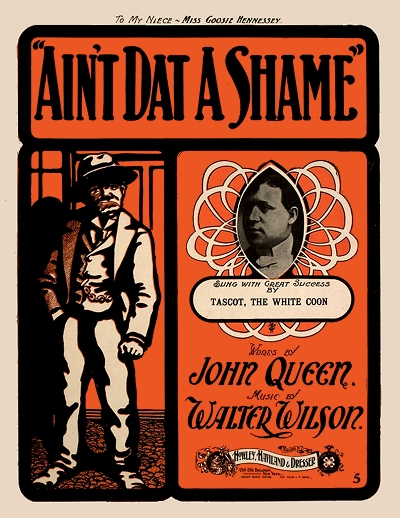
Where this story, while quite plausible, becomes suspect is when one takes into account that Howley, Haviland and Dresser had released a similar song a few months prior titled Ain't Dat a Shame composed by Hughie's stage partner John Queen with music by Walter Wilson. It tells the story of how Bill Bailey got locked out on that stormy night in the first place. Whether this was suggested or inspired by Cannon is unclear, as is the possibility that Cannon simply continued their story. As Queen and Cannon had been partners for a couple of years, it is probable that Mr. Bailey of Jackson came up in conversation. What is striking, however, is that the verse for both Ain't Dat a Shame and Bill Bailey, Won't You Please Come Home are similarly constructed with 12-bar strains, the same as his 1901 piece You Needn't Come Home, so the influence may have been aggregate in this instance.
Although Queen introduced the song on the vaudeville stage, and singer Arthur Collins cut it for the Edison company while the ink was still fresh, the character of Bill Bailey quickly became associated with Hughie as the originator, and from the time of his descent around 1908 to the current day he has often been mistakenly cited as the author of the first Bill Bailey piece Ain't Dat a Shame. Both were written as shameless "coon songs," establishing the main character in the songs as African American and a railroad worker for the Baltimore & Ohio line. There would be more Bill Bailey songs in short order, including I Wonder Why Bill Bailey Don't Come Home (1902 - Frank Fogerty, Matt C. Woodward and William Jerome), Since Bill Bailey Came Back Home (1902 - Billy Johnson and Seymour J. Furth), both published by Howley, Haviland and Dresser, followed by Bill Bailey's Left His Happy Home Again (1903 - Rozier Daughtry), Bill Bailey's Application (1910 - Edna Hooker Day), and When Old Bill Bailey Plays the Ukalele (1915 - Charles McCarron and Nat Vincent).
Cannon continued his haphazard existence through 1903 and 1904, usually working as an itinerant pianist, and bouncing into Manhattan now and then to deposit another song with his publisher friends. He continued to receive support - sometime through references or donations - from Dresser, who benefitted to some degree in the firm that he had recently joined by the continuing success of Cannon's songs and anything Bill Bailey. Hughie struck gold again in 1904, and created a song that is still considered to have set a historic precedent in some ways, but is also tinged with controversy in others.
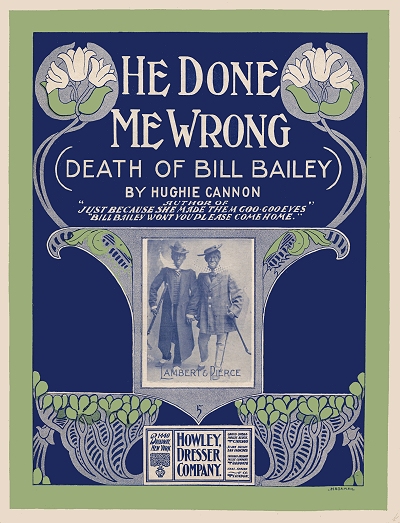
Perhaps in the hope of ending the Bailey knock-offs, Cannon did just that, knocked off Bill Bailey. His 1904 work He Done Me Wrong (The Death of Bill Bailey) was a mournful lament, even for a major key, and was another of the early ragtime era publications that had a true 12 bar blues progression for the verse. Bill is working on the railroad and gets between two cars without the proper caution, then "cars bumped, Bill was no more." That simple. However, the melody for the verse was closely adapted from one that had been going around for (depending on which historian one follows) anywhere from five to fifty years. It was most likely ten years or less, given the authentic blues pattern. That tune making the rounds was known as Frankie and Albert, a song based on the real-life murder of 17-year-old Al Britt in St. Louis by his 22-year-old prostitute girlfriend Frankie Baker. That, of course, is the basis for the song Frankie and Johnny, which would first be published in 1912. It is also questionable who stole from whom, since one of the verses in He Done Me Wrong was either already traditional, or became traditional as a result of its publication.
Bring me your rubber-tired hearses, bring me your rubber-tired hack;
There's twelve men goin' to the graveyard, but eleven are comin' back.
Ooooh he was your man, but he done you wrong!
Cannon's melody is a bit different in places from the one that would be published by the Leighton Brothers and Ren Shields in 1912, but both are recognizable as essentially the same, as were some of the lyrics. It appears that Cannon beat other composers to the punch in terms of getting this story published, and also infused some of his originality into it. Some accounts believe that Dresser once again had a hand in working it out. Yet there was also a challenge to this as even before they claimed Frankie and Johnny as their own, The Leighton Brothers released the same tune as Bill, You Done Me Wrong with only slightly revised lyrics under their name in 1908, and didn't even bother to change Bill Bailey's name in those lyrics. No matter its origin, He Done Me Wrong remains as strong an entry as Bill Bailey, Won't You Please Come Home, even though it is infrequently performed today, likely due to its somber tone. Somber also describes the financial return that Cannon got from sales of the piece, although it appears that Dresser once again provided some assistance.
At the same time that Bill Bailey met his demise, Hughie Cannon was getting closer to his, as relayed in this article in the [New York] Sun of January 31, 1904:
SONG WRITER IN BELLEVUE.
"Bill Bailey's" Author Says He's Been Drinking Since He Was 10. Hugh Cannon, who wrote "Won't You Come Home, Bill Bailey?" and other popular airs, was taken to Bellevue Hospital yesterday afternoon in a cab from the Winsonia [Hotel]. He was accompanied by Paul Dresser, the composer, and another friend who told Dr. Coleman that Cannon has been drinking heavily of late and was on the verge of delirium. "How long have you been drinking?" asked Dr. Coleman of Cannon? I have been trying faithfully to decrease the visible supply of spirituous liquors for sixteen years," replied Cannon. He is 26 years old now.
A subsequent jail sentence sometime during the next year helped to temporarily relieve him of his drug addiction, and Hughie evidently did straighten out for a while in 1904 and 1905. One great boost to him was the interpolation of a song that was requested by stage singer May Irwin into her 1904 hit show Mrs. Black is Back. I Love the Two Steps (With My Man) reportedly yielded him a payment of $350, the largest he ever received for a single work.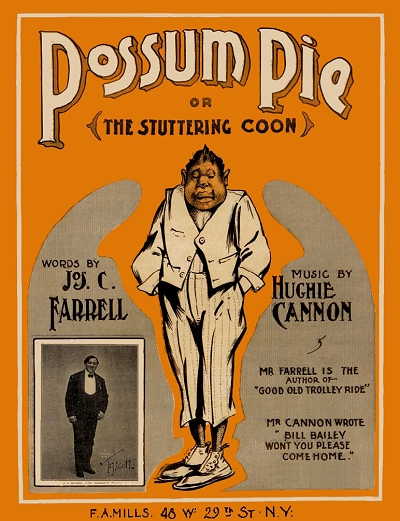 He also composed a piece with Irwin that may have been intended for but was not used in the full run of the show, Albany, or Dat's de Only Town Looks Good to Me. Several other songs were completed during his 1904 stay in New York, including a couple that were released in early 1905. These would be the last known pieces of the Cannon canon. Then Hughie returned to Jackson a little better off, but not for long.
He also composed a piece with Irwin that may have been intended for but was not used in the full run of the show, Albany, or Dat's de Only Town Looks Good to Me. Several other songs were completed during his 1904 stay in New York, including a couple that were released in early 1905. These would be the last known pieces of the Cannon canon. Then Hughie returned to Jackson a little better off, but not for long.
 He also composed a piece with Irwin that may have been intended for but was not used in the full run of the show, Albany, or Dat's de Only Town Looks Good to Me. Several other songs were completed during his 1904 stay in New York, including a couple that were released in early 1905. These would be the last known pieces of the Cannon canon. Then Hughie returned to Jackson a little better off, but not for long.
He also composed a piece with Irwin that may have been intended for but was not used in the full run of the show, Albany, or Dat's de Only Town Looks Good to Me. Several other songs were completed during his 1904 stay in New York, including a couple that were released in early 1905. These would be the last known pieces of the Cannon canon. Then Hughie returned to Jackson a little better off, but not for long.Once back in Michigan Hughie cleaned up at least temporarily, and played in some of the saloons there, more or less counting on his fame as a composer to obtain the work. He soon met Emma May Dorson and the pair were married in Jackson, Michigan on September 30, 1906. He claimed to have been born in 1873 at the time, contrary to his actual age of 29. Their happy union was not so happy after even a few months, and she filed for legal separation on June 10, 1908, putting Cannon back on the street much like Mr. Bill Bailey had been dispatched. Emma clearly noted drunkenness as the sole reason for the separation and subsequent divorce, but she had some other things to say to the court as well. According to Emma, "For a period commencing about a month after our marriage and continuing to the time of our separation, defendant was drunk nearly every night; he seldom if ever remained at home to spend the evening but would consort with people of evil repute and would generally come home about 2 or 3 o'clock in the morning in a drunken condition." She also asserted that he "doesn't know a note of music" but simply dictated his songs.
Even before the separation, Cannon was a regular visitor to the Jackson County Jail on account of public drunkenness and other misdemeanors. Following his separation, he returned to Detroit to try and make a living. A notice in the Music Trade Review of August 1, 1908, under "The Review Hears", said that "poor little Hugh Cannon, the writer of 'Bill Bailey,' 'Ain't Dat a Shame' [incorrect] and 'Just Because She Made Them Goo Goo Eyes,' is in Detroit sorely in need of assistance." Three weeks later a syndicated notice made the rounds, saying that "Hughie Cannon, the author of 'Goo-Goo Eyes' and many other coon songs, is playing the piano in Detroit saloons to keep body and soul together."
Hughie all but disappeared over the next year, drinking himself out of favor with the local drinking establishments that would no longer employ him, and becoming a regular in Detroit jails. This is also the period in which the Leighton Brothers started releasing what were essentially retooled versions of a couple of his compositions, possibly figuring that Hughie was no longer a legal threat to anybody. Cannon emerged once again in late January 1910, when he entered one of the state houses for the destitute, as more of a pathetic figure than anything, but also as a lesson of the ravages of living the "sporting life," in some surprisingly honest interviews with various journalists. One of the earliest appeared in the El Paso [Texas] Herald of January 26, 1910, in a clever format using the titles of his songs, but also as a lament:
"Just because she made them goo goo eyes," he soused in the wealthy water. He bathed in it.
"Ain't that a shame," but that couldn't be helped. He hit the coke for fair. But he quit it.
"Won't you come home, Bill Bailey," she said. But he was down in Chinatown with the rats, puffin' the pipe. He puffed with the best of pill cooks. And then he broke his yen.
"Ain't that a shame?" again he said. He broke away all right. But - you know old puffin' partner - he fell to the liquid ban-she. Soon he was on the gun. But he checked the morphine in the street, and then -
"Just because she made those goo goo eyes," he fell to the Tiffany water again. And then he fell to the suds, and then - "Gimme some o' th' nickle tea" - you know.
And so he broke his yen, soaked his gun, sprinkled the coke in his shoes. But he couldn't break the booze yen. He hit the mirror back joint every night, and packed a jug home every morning.
And now he has gone "over the road," not to the joint with more bars than glasses, but to the down and outers' bunk house. His name is Hugh Cannon, and he bought his booze sellin' coon songs. He's in a poorhouse up in Michigan, "Just because she made them goo goo eyes."
Bill Bailey's come back home, but not poor old Hughey Cannon. "Ain't that a shame?"
The more widely circulated story from early February was accompanied by the picture and cartoon reproduced here, and was written with a sadly predictive opening sentence:
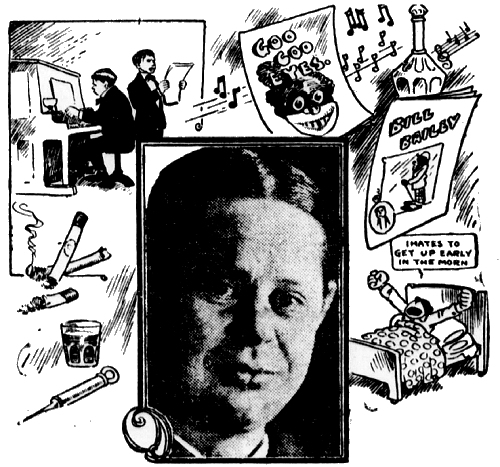 The beginning of the end has come for Hughey Cannon, author of [a list of his pieces], song hits that should have made him wealthy - and now he is in the local poorhouse at Eloise [Michigan]. He affixed a scrawly signature "Hugh Cannon" that has appeared in great, gawdy letters on sheets of music all over the world, to an application for admittance to the retreat a few days ago.
The beginning of the end has come for Hughey Cannon, author of [a list of his pieces], song hits that should have made him wealthy - and now he is in the local poorhouse at Eloise [Michigan]. He affixed a scrawly signature "Hugh Cannon" that has appeared in great, gawdy letters on sheets of music all over the world, to an application for admittance to the retreat a few days ago.Drink, cigarets, opium, cigarets, morphine, cigarets, cocaine, cigarets, more drink, and more cigarets - and the night life of the tenderloin cafes, where Hughey has pounded out his life on the keys of tuneless pianos - that is the story.
The line is not very closely drawn in Detroit's lower tenderloin cafes, but Hughey had passed it. They wouldn't have him tickle the ivories anywhere any more. He had been on the toboggan here some time before he splashed into oblivion at the poorhouse.
Cannon should have made big money from his lyrics of the tenderloins that he pounded out, expressing the wild throbbing of his restless brain in the smoke-laden and beer-smelling atmosphere of the resorts - but he didn't. "'Goo-Goo Eyes,'" he said, "I sold for $25. 'Bill Bailey' I gave away. I pulled down $350 for one I wrote May Irwin - I fergit its name - but that the most. I ought to have stuck to my cartoonist work instead of going wild over ragtime."
Finally in March he revealed even more of his history, as noted in the Music Trade Review on March 12, and other papers during that month:
FORMER SONG WRITER NOW A WRECK
Some Comments on Career of "Hughey" Cannon, Who Composed Successful Songs, and Whom the Night Life of Broadway Led to Ruin.
The downfall of Hugh Cannon, once a well-known figure in the night life of Broadway and a composer of successful songs, is no longer news to his former colleagues. He sought the shelter of an almshouse in Detroit some weeks ago. His former friends are inclined to blame him for his actions of the past, but although by his own admission he took to selling his compositions to several publishers simultaneously, thereby creating much confusion and the loss of money paid in good faith, his circumstances at least call for sympathy. "Hughey" will never again be in a position to write a "hit" for a publisher, nor to cause trouble for anyone.
"I started when I was sixteen," said Cannon, referring to the habit of drink which proved his ruin. "I'm thirty-six now [he was actually approaching 33], and except for seven months on the water wagon I've been intoxicated most of the time. It was twenty years—twenty black, sick, nasty years—with only a little brightness now and then when I made good with some song. I quit the cocaine easily. Fifteen days in jail cured me of that. I 'hit the pipe' In New York for a year and stopped that, too. I bucked against the morphine hard and quit that, but the red booze—that's what got me."
"Poor Hughey," said one of his more charitable friends. "He couldn't 'stand the gaff.' That's why he's in a poorhouse now, instead of living in one of these good hotels. He was too free with his money when he had it, and thought he could always write a song that would be a 'hit.'" And Broadway has had no trouble in forgetting about "Hughey" and "Bill Bailey," too...
By June, Hughie was nowhere to be seen, and could not be reliably located in the 1910 enumeration. His mother, who had either washed her hands of him or all but forgotten her son by now, was no longer on the road and found living in Connellsville, Pennsylvania, where Fred was managing a local theater. A younger son, George S. Robbins (possibly by William Smith) and his bride were living with the couple, working as an actor and actress, probably for Fred. It is curious that in 1900 May listed that she had three children and all were living. As of 1910, however, she listed three out of six children surviving. Whether Hughie was one of those regarded as deceased by her at that time is unknown. She would soon know for certain.
Hughie all but disappeared from public view again from 1910 through early 1912, picking up playing here and there, and becoming increasingly ill from the ravages drink had wrought upon his beleaguered liver. He was in Toledo Ohio in June 1912 when he managed to make the news twice on the same day. Hughie had collapsed earlier in the month and was sent to the Lucas County [Ohio] Infirmary. He died there on June 17 as a result of cirrhosis of the liver. However, and Hollywood could not have scripted the story with much more bizarre cruelty, the final crushing blow of his difficult life actually came, thankfully, within a few hours after the end of his life. That very same day, Emma Cannon was finally able to secure her final divorce decree in Michigan, not knowing that, as one headline writer cleverly stated, a "Higher Court had interfered with the Cannon divorce case."
Officially the divorce was moot and she was Hughie's widow, and technically could have used that status to buy back and renew some of his copyrights in the late 1920s. However, it is unclear if she ever regarded her widow status. Hughie Cannon, the self-destructive songwriter with so much potential, was dead at age 35.
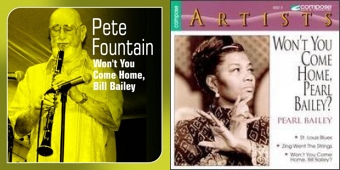 |
May Robbins had her son's body sent to her in Connellsville, where it has been interred ever since. He remained there somewhat in obscurity for nearly a century. There was a feature story in the Pittsburgh Tribune-Review in 2006 concerning efforts by historians to have the state put a historic marker at his grave in Connellsville. It was ultimately turned down since, as the state regarded the situation, Cannon's story was not particularly unique despite his hit song, and actually more typical of the time. Some efforts have continued into the 2010s, but it appears little will be done in regards to honoring Cannon in his final resting place.
Hughie's songs, or to be more specific, that particular song, will evidently never die. Bill Bailey has been in print one way or another since its first publication, including in song books, fake books, nostalgia books, band and orchestra arrangements, and even electronic download form. It has been recorded well over 1000 times by artists ranging from Louis Armstrong to Bobby Darin, and hardly a jazz or ragtime festival goes by without at least a few performances of Bill Bailey, Won't You Please Come Home. It is one of the most recognizable tunes of the ragtime era, even by the youth of the 21st century, and remains one of the top sellers from that decade.
And what of his most famous character? Willard Bailey managed a music store in Jackson through 1908 or so. At that point he abandoned Jackson for California and Sarah went with him, in spite of their now famous and questionable marriage. He played in orchestras and taught music for several more years, but also reportedly continued his philandering. Bill Bailey was finally kicked out for good in the mid-1910s when Sarah divorced him. She then returned to Jackson and eventually married a local farmer. In the 1920 census Willard Bailey is shown as a salesman for a music store in Los Angeles, California, living with his daughter Frances and an aunt, and in 1930 at age 60 he was working in advertising. The two Baileys still appear to have remained on friendly terms through his California death in April 1954. Sarah said she finally got used to the joking about her status as Mrs. Bailey, which apparently continued until she died in a nursing home at 104 in 1978. Both of them and their creator live on more than a century later thanks to that famous ragtime song.
Most of the information here was compiled from public records, newspapers and periodicals. Some of the information on Cannon's birth and divorce were obtained from Michigan state vital records. However, without the diligent work of the late Mike Montgomery, Detroit's number one ragtime and early jazz historian and collector, some of the information compiled here might have been difficult to confirm, as he had a couple of articles and interviews which substantiated other materials located. We will miss your fine dedicated work Mike.